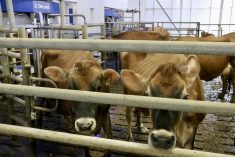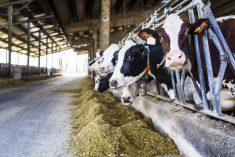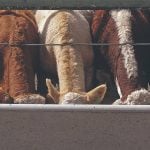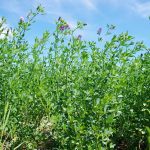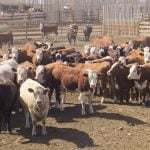Changes are being made to the timetable for the remainder of the program compensating Canada’s dairy farmers for market share lost to recent multilateral trade deals.
The Dairy Direct Payment Program (DDPP), which issued $1.75 billion over four payments from 2019 to 2023 to compensate for the Canada-European Union (CETA) and Trans-Pacific Partnership (CPTPP) trade pacts, this year begins to roll out $1.2 billion over 2023 to 2029 to compensate for the Canada-U.S.-Mexico Agreement (CUSMA).
The plan for CUSMA compensation for supply-managed sectors was first laid out in broad strokes last November.
Read Also

Ample supplies and improved livestock sector to boost Canadian feed sector: FCC
Abundant feed grain supplies and improved profitability for the livestock sector should support strong feed demand and sales through the winter, says a new report from Farm Credit Canada.
One significant difference announced Tuesday for this segment of the DDPP is that dairy producers must hold a valid dairy quota licence registered with a provincial milk marketing board or agency on Aug. 31 to be eligible for a payment in a given year.
Previous DDPP program years had used an Oct. 31 calculation date. The government noted Tuesday that this change has been made “in consultation with industry.”
Since the calculation date affects the opening of the program registration period, setting the date earlier in the year “will ensure producers have more time to sign up before the deadline and may receive their payment sooner.”
The registration period for the fifth payment is expected to open this fall of 2023. Eligible producers must register before March 31, 2024, the government said.
Those producers can expect letters from Agriculture and Agri-Food Canada in the fall with registration details. Payments would follow once a producer completes the registration, AAFC said Tuesday.
Setting the new quota reference date for the DDPP will ensure producers “have the necessary information further in advance to be able to plan and evaluate their farm situation,” federal Agriculture Minister Marie-Claude Bibeau said in Tuesday’s release.
Sustainability research
Bibeau on Tuesday also announced an unrelated funding envelope of over $7.5 million for Dairy Farmers of Canada (DFC) from the federal AgriScience Program – Clusters Component.
AgriScience — a federally funded program under the Sustainable Canadian Agricultural Partnership (S-CAP) — will back DFC for research into “solutions to improve the environmental and economic sustainability, and resilience of the Canadian dairy industry.”
To that end, the government said, DFC is to develop and implement plans to reduce greenhouse gas (GHG) emissions and sequester carbon, and to improve the health and welfare of cows and the quality of milk produced.
Outcomes in the former area are expected to help the industry hit DFC’s previously stated goal of reaching net-zero GHG emissions from dairy production by 2050. Research in the latter areas, meanwhile, will include antimicrobial use and antimicrobial resistance in dairy cattle, genetic improvements in cattle, and “eco-efficient” dairy processing.
DFC president Pierre Lampron said in a separate release that the funding is “essential to enable strong, robust and evidenced-based research material that ultimately helps dairy farmers increase the efficiency of their farms.” — Glacier FarmMedia Network






